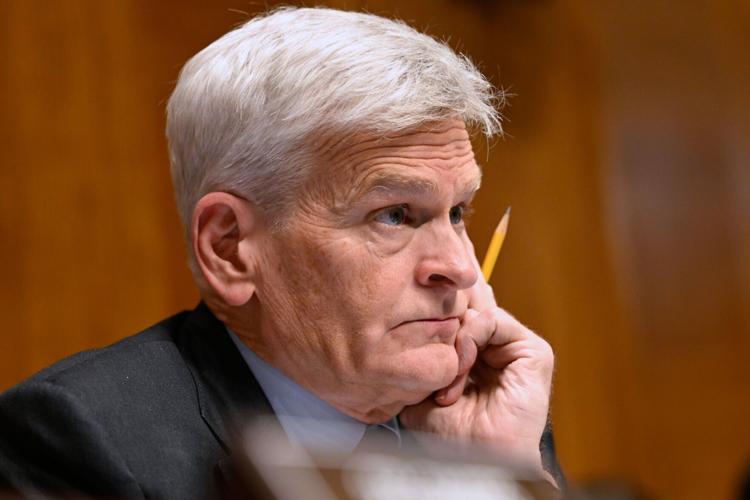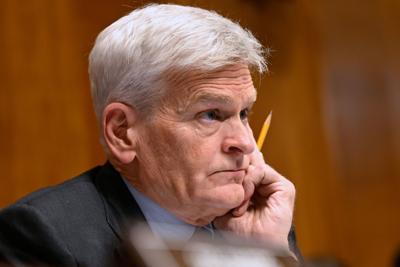In June, U.S. Sen. Thom Tillis, of North Carolina, announced he was retiring after opposing President Donald Trump on the One Big, Beautiful Bill Act, due to myriad concerns about the bill and how the vote was handled. Tillis was unsparing in his criticism of the culture he’d decided to leave.
“Too many elected officials are motivated by pure raw politics who really don't give a damn about the people they promised to represent on the campaign trail,” he said. He followed up by saying that, for the remainder of his term, “I look forward to having the pure freedom to call the balls and strikes as I see fit.”
His stinging indictment of Washington was uncharacteristically blunt. But in choosing not to run for reelection, he’d removed most real consequences. But it raises the question: Why only now call balls and strikes? Is an office worth keeping for its own sake alone?
On Oct. 9, 1964, a time no less polarized than now, President Lyndon Johnson raised these issues to every major officeholder in Louisiana in a too-little remembered speech at the Jung Hotel in New Orleans. Johnson was running for reelection, having signed the landmark 1964 Civil Rights Act months earlier. Johnson knew the bill was toxic in Louisiana at the time. Instead of dodging the issue, he decided to call out the cowardice and hypocrisy of his fellow Southern politicians.
Alluding to the Civil Rights Act, Johnson said, “The people that would use us and destroy us first divide us ... all these years they have kept their foot on our necks by appealing to our animosities, and dividing us. We have a Constitution and a Bill of Rights, and we have the law of the land. And two-thirds of the Democrats in the Senate voted for it, and three-fourths of the Republicans. I signed it, and I am going to enforce it and I am going to observe it.”

Cliff Smith
Johnson then told the story of an old senator, "whose name I won't call," who once asked Speaker Sam Rayburn for encouragement to make one last speech for the good of his troubled state.
"I feel like I have one in me," Johnson quoted the unnamed senator. "The poor old state, they haven't heard a Democratic speech in 30 years. All they ever hear at election time is N*****! N*****! N*****!”
Johnson’s use of the N-word shocked the audience. The word was common at the time, but none would use it openly in such a setting. The Times-Picayune quoted him as saying "Negro! Negro! Negro!" Johnson himself corrected the record in his own memoirs. His speech addressed the ugliness of the word but subverted its power, using it to call out the hypocrisy of the politicians and their enablers who knowingly channeled our worst impulses.
Johnson’s meaning was as clear as it was indirect: Too many of his fellow politicians were wasting their political careers by ignoring the reasons they sought office in the first place, and engaging in the basest prejudices just to hold office. His unnamed senator only realized in his last days that he’d had the opportunity to do good but chose the easy path instead.
Louisiana’s U.S. Sen. Bill Cassidy has publicly struggled with this dilemma. After a landslide reelection in 2020, Cassidy boldly voted in the second impeachment proceeding to convict President Donald Trump for his clear misdeeds on Jan. 6, 2021, but Trump’s surprising rebirth put him in a bind. Cassidy was clearly troubled by the nomination of Robert Kennedy Jr. for secretary of health and human services, but he ultimately supported him.
But recently, Cassidy expressed frustration at Kennedy for cutting mRNA vaccine funding, something Kennedy strongly implied he would not do during his confirmation hearing. It's something Cassidy could have stopped by withholding his confirmation vote. Repeatedly, Cassidy and Tillis have faced the same dilemma as Johnson raised in the '60’s — take the easy path by playing to people's prejudices and tribal instincts, or take risks, and hopefully do some good.
I wouldn’t presume to tell Cassidy or Tillis what to do. But I would remind them of Johnson’s warning: Use your time in office for the good of your state and your country. Don’t end your careers regretting the good you could have done, but failed to do out of fear.



